Addictions slowly killing our youths
Addiction is the inability of someone to stop using a substance or engaging in a behaviour even though it is causing psychological and physical harm to such a person. People with addiction use substances or engage in behaviours that become compulsive and often continue despite the harmful effects involved. Government, private organisations and relevant stakeholders […]

Addiction is the inability of someone to stop using a substance or engaging in a behaviour even though it is causing psychological and physical harm to such a person. People with addiction use substances or engage in behaviours that become compulsive and often continue despite the harmful effects involved.
Government, private organisations and relevant stakeholders have been expressing worries and apprehension by mere looking at the rate of addiction among the younger generation. This addiction comes in different forms; hence, we will be precise on the ones that are common among students.
Nigerian students – from primary to tertiary institutions, are exposed to different forms of addictions which have continued to exert negative effects on their academic performance and general well-being.
Chemical addiction is the commonest kind of addiction that involves the use of substances. This can be tricky to talk about because there’s often confusion around what constitutes substance misuse, dependency and addiction.
- Why Taraba governor is afraid of my candidacy – Senator Bwacha
- 73.9% of Jigawa children are multi-dimensionally poor, says UNICEF
Students nowadays abuse substances like alcohol, nicotine, cannabis, cocaine, amphetamines etc. The use of cigarettes, Indian hemp, shisha, smokes or inhalers are also among the commonest substances of addiction among students. In many occasions, students have been caught, punished or expelled from schools as a result of chemical use.
Social media addiction happened to be the second on the list. This involves the excessive use of social media platforms such as Tik Tok, Instagram, Twitter, Snapchat, Telegram etc. Students use these social media platforms without regard to proper time management. They smuggle phones to school and browse their favourite sites and platforms even when lessons are going on. They spend more time at home on social media, neglecting their homework or assignments. These students use social media day and night, forgetting the need for their extensive studies at home.
Thirdly, there is also addiction to sports and video games. Recently, a report released by the World Health Organization (WHO) cautioned that addiction to video games is among the leading causes of stress, anxiety and depression among the youths. However, in Nigeria today, a large number of students are already addicted to these video games. Many are also addicted to sporting activities such as football and the rest. Students nowadays will rather play football or video games instead of paying attention to their studies.
Sports and games have in fact dominated the lives of many students so much that they begin to treat their other aspects of life with utmost contempt. This form of addiction is evident in the number of football viewing centres, football fields and stadia.
In light of the above, many of those found with substance addiction have significantly shown adverse effects on their academic performance, social interactions as well as their physical and psychological fitness. Therefore, addiction is gradually becoming a disease, eating deep into the fabrics of our educational system in Nigeria. Poor performances in school internal and external examinations; increasing number of schools drop outs and half-baked graduates are among the devastating effects of this social media addiction, which we are currently witnessing in our society.
In conclusion, our governments, parents, schools, community leaders and relevant stakeholders must work together in order to provide lasting solutions to these forms of addiction among students if we are to salvage our educational sector, as well as the future generations.
Hafsat Sanusi Tsafe wrote from Zabib College Kaduna
